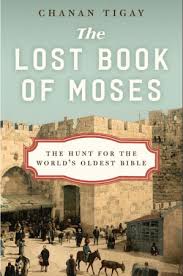Review: Lost Book of Moses May 9, 2016
Author: Beach Combing | in : Ancient, Contemporary, Modern , trackback
Chanan Tigay, The Lost Book of Moses (Harper-Collins, 2016)
This blogger has a dilemma. There are three pages of a century-old book he wants about an obscure English county. The book is not present in any library in the world, but one copy exists in the hands of a bookseller who wants about two hundred dollars for it. So will Beach go ahead and buy the book, paying about seventy dollars for each page that interests him? Of course, he will because the three pages involve his obsession.* Scholarly obsessions are wonderful, wonderful things unless you happen to be married to them. They have powered many fields of historical endeavour, particularly fringe ones from Jack the Ripper to Jesse James, and from Richard III to Shapira. Sha-who, you ask, and this brings us to The Lost Book of Moses by Chanan Tigay.
Moses Wilhelm Shapira was a Polish Jew who, in 1883, while a resident in Jerusalem, tried to sell the oldest copy of Deutronomy to the British library for a million pounds (that would buy you an aircraft carrier today). His scrolls were initially taken very seriously but soon decried as a fraud and Shapira went from being an international personality to being a despised failure. He travelled to the Netherlands and, looking at a churning black river, put a bullet in his head. He was 54. Sad doubtless, but where is the obsession? Well, there has, for the last half century, been the suspicion that Shapira wasn’t a faker but that he had stumbled on the first ‘Dead Sea Scroll’. This is beyond proof. But if we could examine Shapira’s trove we would know. However, and this is where the obsession begins, no one has any idea where his scrolls are.
The Lost Book of Moses has two intertwining parts. The first is the history of Shapira’s journey from ignominy to, well, ignominy (‘clogs to clogs’ they say in Lancashire); and the second is the description of how Chanan became interested and, then, cat-nip crazy with the search for Shapira’s missing scrolls. Both are fascinating but the truth is that the scholarlogue is more intriguing than the history (colourful as that is). Which would you prefer, the tale of a difficult individual from a (then) despised race in a marginal country loading his pistol; or an articulate journalist from a colourful background becoming mad in interesting ways? Chanan is a fine stylist and his own introspection and perhaps, too, his understanding of the relative absurdity of what he is doing makes him an ideal narrator: this, note, cannot normally be said about obsessives who tend to be rather low on self knowledge…
So Chanan, an American, gets on a plane to Australia because of an email: and looks for a man in a city of four million by visiting churches after a detective agency fails to track down his mark. Chanan travels to one of the least pleasant parts of the UK because of a notice in a nineteenth-century journal of sea-shell studies. Then, when, there he somehow enlists a hotel worker to search her place of work for the missing scrolls, just in case they were left lying around in the attic (!). In fact, he has that rare ability – though one that is quite common among obsessives – to create folie à deux (or more): at one point he has a complete stranger drive him around Sydney; at another he convinces a man to change his mind by getting him to chat to God in a restaurant toilet; at another he tries to talk his way into Shapira’s wife’s bedroom in Germany.
Perhaps, Chanan does not see it like this, perhaps he thinks that the history is more important than the quest. But the history is footnote stuff: a wonderful, feast-your-eyes footnote, admittedly but a footnote none the less. Remember we are not arguing about whether Shapira found the oldest Bible in the world, but whether he found some ‘Dead Sea Scroll’ or whether he created a fake. Nothing really changes apart from our understanding of Shapira: and perhaps (assuming a genuine text) a few rogue variants in Deuteronomy. Chanan ends the book with a definite answer and some new proof. One of the remarkable things about The Lost Book is its keep-reading-me suspense (the architecture of the books is excellent): this is one of these rare non-fiction works where the reviewer has to be aware of spoilers.
A few final thoughts. First, Beach while reading the book thought of several other ways to search for Shapira information, but promised himself he wouldn’t. One obsession is enough: Shapira clearly drags you in… Second, he is, though, looking forward to reading other reviews from Shapira obsessives: he anticipates some interesting and, of course, enjoyably petty bitchiness. Third, Harper-Collins usually offer interviews with their authors, but the person Beach would really like to talk to is Chanan’s wife. My heart goes out to you Mrs T.!
Beach is always interested in excellent books: drbeachcombing AT yahoo DOT com
*Redacted for the sake of personal dignity.


